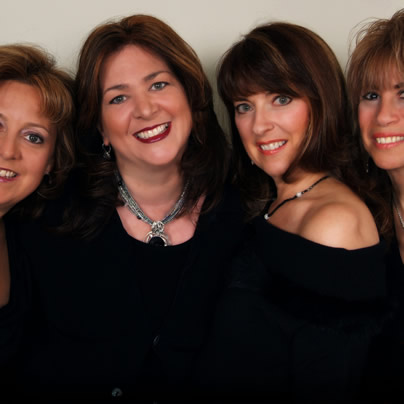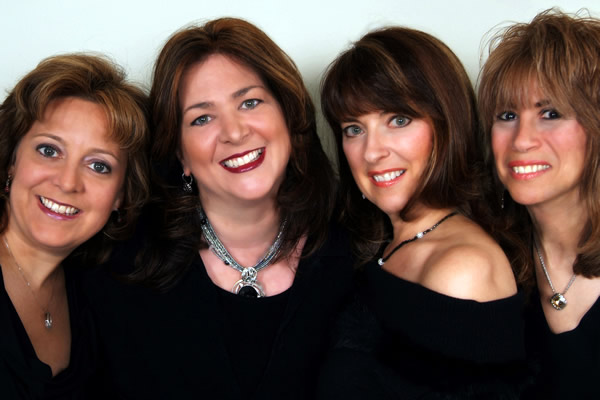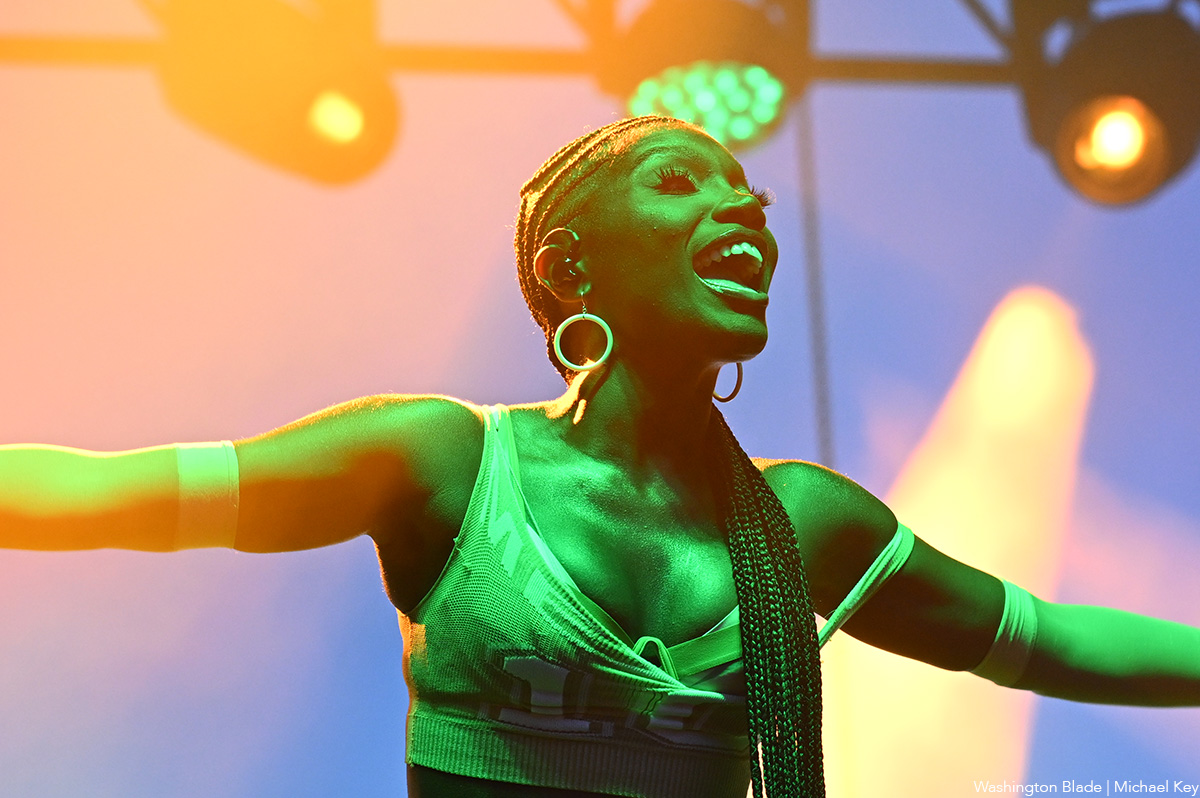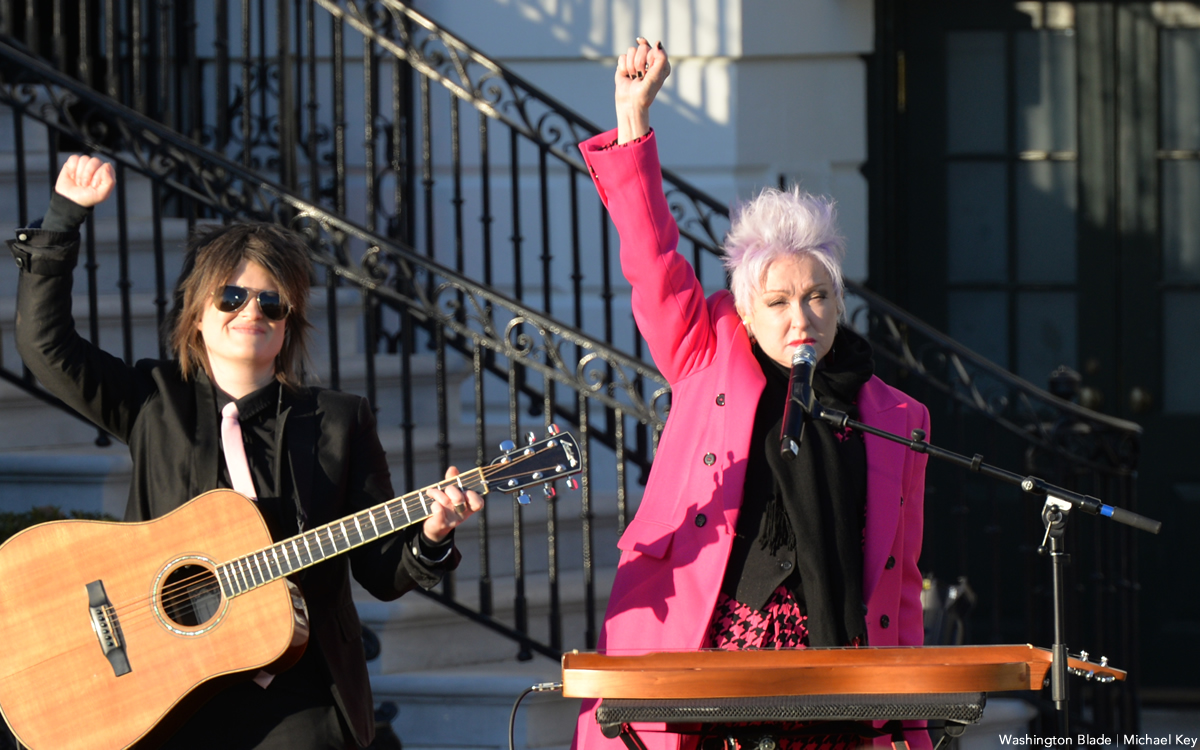Music & Concerts
Comical musical foursome
Four Bitchin’ Babes to play Birchmere next week

Bitchin’ Babes
The Birchmere
3701 Mount Vernon Ave.
Alexandria, VA 22305

The Four Bitchin’ Babes have been playing the Birchmere for nearly 25 years and return next weekend. (Photo by Terry Jordan; courtesy of FBB)
Describing a show by The Four Bitchin’ Babes comes down to a few words: witty, musical and bling. The jewelry they wear has become a staple for the women but the gal pals really shine with their wit and musical abilities.
When The Four Bitchin’ Babes play the Birchmere Dec. 14-15, it will be more than just another stop on their 50-city tour, it will mark a return to the place where the comical musical foursome became the force that they are today.
The story of the origins of the group begins in 1990, when singer Christine Lavin released a compilation album of winter folk songs and enlisted some musical friends to join her on a road show combining laughter and music.
The original foursome included Patty Larkin from Cambridge, Mass., Megon McDonough from Chicago and Sally Fingerett, from Columbus, Ohio, and the gals went to seven cities, ending at the Birchmere. It was there that they recorded their show and officially became The Bitchin’ Babes.
“We have been playing the Birchmere for 23 years and we always do two nights because it’s kind of our home away from home for us,” says Fingerett, the last remaining original member. “Our first and fourth records were recorded live there and the audiences have always been so welcoming to us there and we look forward to playing year after year.”
Over the years, The Bitchin’ Babes have grown and refined their show, developing the perfect combination of music, comedy and fun. The group’s lineup consists of Fingerett, long-time members Debi Smith and Deirdre Flint, and newcomer Marcy Marxer.
“We are four singer-songwriter-comedian-actress composers who stand in a row on stage together and take turns in the spotlight,” Fingerett says. “When one girl is at the microphone, she becomes the diamond broach and the other three play instruments, sing harmonies and support her as needed.”
Each of the women comes from a different city and all admit that they have different views, personalities and lifestyles, but when they meet up every year for their annual September to June tour, they’re like sorority girl BFFs who haven’t seen each other in ages.
“If we lived in the same city, we would be best friend whacky neighbors, but because we don’t, when we do see each other, it’s just about being best friends,” says Smith, who has been part of the Babes since 1994. “Some of us have other careers, children, spouses and other things going on in our lives, and we always have so much to share and look forward to this time together.”
Over the course of 22 years, some Babes have come and gone, and re-invention becomes the Babe mantra. When Nancy Moran said goodbye last year, it was time to find someone new.
“When we look to hire a new Babe, we know there’s a lot of beautiful, talented performers out there, but what’s important to us is that there’s a spiritual connection and a like-mindedness,” Fingerett says. “We need someone with no drama, someone who can wake up in the morning, shower, put clothes on and hit the road. Someone who can bring in different flavors and ideas.”
The group filled the spot with Grammy winner Marcy Marxer, a well-regarded folk singer from Maryland, who is out and recently married her partner of 31 years.
“I wanted to join them because of the bling factor,” Marxer jokes. “I really love them as people. They are wonderful friends and I think we ebb and flow around each member perfectly and they know how to run a band. They are very accommodating and flexible and that’s why they’ve been around so long.”
Marxer appreciates that the band is a hit with the LGBT community and thinks the girls’ humor and attitude is what attracts the crowd.
“We see people of all kinds and everyone is welcome,” Marxer says. “The thing we have in common is we all want to have a good time.”
Smith said that the fact that they are four women who love each other is a factor in their appeal.
“Love is so much bigger than gender and we present that.” Smith says. “Our show is beyond what goes on between men and women — we are very non-gender specific, loving, kind and supportive. We don’t have love songs about men, we sing about getting lost in the parking lot and things that don’t apply to gender at all.”
Fingerett also is well known for writing the hit song, “Home Is Where The Heart Is,” a tune about accepting people regardless of sexual orientation that Peter, Paul and Mary covered on their album “Lifelines.”
“It’s a song of tolerance and compassion,” Fingerett says. “It’s sung by LGBT groups all over the country. The songs is on our first CD and since then, we’ve had a wonderful and supportive gay and lesbian following.”
The Bitchin’ Babes have released nine successful albums, starting with “Buy Me, Bring Me, Take Me, Don’t Mess My Hair, Life According to Four Bitchin’ Babes Vol. I,” which captures the freshness and excitement of four women, four different songwriters, living four different lives, singing of their own individual experiences as female artists. Over the years, they have touched on topics from new shoes to bald headed men to hot flashes.
“Audiences have grown up with us and we see some of the same fans we saw in 1990,” Fingerett says. “We reinvent the wheel every record and they can still relate to what we are singing about.”
Their newest recording, “Mid Life Vices” explores women’s neurosis, passions and misdeeds, with songs about Facebook, relationships and cheese.
On the recording, the girls play everything from acoustic and electric guitars to mandolins to the piano to Irish Bodhran drums.
“We are celebrating the release of the CD at the Birchmere show and will put a holiday spin on it,” Smith says. “There will be some poignant songs for drama, comedy, but no politics and nothing blue. Audiences return year after year because there are always new songs and now we even have a new member.”
As part of the show, Fingerett delivers a comedic routine about how she is a Jewish girl born on Christmas Day (a true story), and there’s this great song about a Christmas sweater showdown.
“There is a pink cloud of generosity and spirit in all four of us,” Flint says. “This night will be an evening of entertainment and laughs where everything is left at the door.”
With so much to love, Fingerett says the thing she loves most about being in the Bitchin’ Babes is the camaraderie and fun they all have on stage. For Flint, her favorite thing about the estrogen-filled group is that every week she gets to go on a girlfriend’s getaway weekend.
“For me, it’s all about the great friendship and knowing the audiences leave feeling good,” Smith says. “Someone recently came up to me after a show and said it felt like a great therapy session. Knowing that we can help people as well as entertain is a great feeling.”
Music & Concerts
Washington chorale kicks off Christmas with vibrant program
‘Thine Own Sweet Light’ concerts planned

The full Washington Master Chorale will return for its annual holiday concert tradition with “Thine Own Sweet Light” on Friday, Dec. 19 and Sunday, Dec. 21 at St. Ann’s Catholic Church (D.C.) and Church of the Epiphany (D.C.).
The concert will feature the rich sounds of the 50-voice, a cappella chorus performing lush, seasonal choral music inspired by the theme of light. Highlights include Edvard Grieg’s “Ave Maris Stella,” Eric Whitacre’s “Lux Aurumque,” and Christopher Hoh’s “Holy, Holy, Holy is the Lord God of Hosts.” The program will also present a new work by Barcelona composer Josep Ollé i Sabaté, along with charming holiday folk songs and seasonal favorites.
For more details, visit the Washington Master Chorale website.
Music & Concerts
Queer mega stars (and allies) ready to take D.C. stages this fall
Watch LGBTQ icons light up stages across the DMV as they sing, dance, and drag their way through spectacular shows.

One of the best ways to welcome fall is by catching LGBTQ performers (and their allies) lighting up some of the D.C. area’s biggest stages. From country and pop to drag and rock, the season is packed with shows you won’t want to miss.
Maren Morris – The country, rock, and pop diva—known for hits like “The Bones” and for standing up against Nashville’s anti-LGBTQ voices—takes the stage at Wolf Trap (1551 Trap Rd, Vienna, Va.) on Friday, Sept. 12 at 8 p.m. Tickets start at $64.
RuPaul – The mother of modern drag and host of “RuPaul’s Drag Race” will spin a DJ set at Echostage (2135 Queens Chapel Rd NE) in Northeast D.C. on Sept. 20. Before RuPaul swaps wigs for headphones, Trade and Number 9 owner Ed Bailey will warm up the decks. For tickets and details visit echostage.com.
Conan Gray – The queer pop prince, celebrated for his Gen Z anthems like “Heather” and “Maniac,” brings his Wishbone Pajama Show to EagleBank Arena in Fairfax, VA, (4500 Patriot Cir) on Sept. 20 at 8 p.m. Tickets start at $113. For more info visit shop.conangray.com/pages/tour.
All Things Go Music Festival – With a lineup that includes Noah Kahan, Lucy Dacus, Kesha, Clairo, Doechii, and more, the beloved LGBTQ-friendly festival takes over Merriweather Post Pavilion (10475 Little Patuxent Pkwy, Columbia, Md.) Sept. 26–28. For tickets and details visit allthingsgofestival.com.
BERTHA: Grateful Drag – This unique tribute brings drag artistry and the sounds of the Grateful Dead to The Atlantis (2047 9th St NW) on Sept. 27. Tickets start at $47 at theatlantis.com.
Peach PRC – Rising Australian pop star and out lesbian, whose confessional tracks like “Perfect for You” and “Forever Drunk” have made her a queer TikTok darling, performs at The Atlantis on Sept. 29 at 6:30 p.m. The show is general admission only. Additional details are on theatlantis.com.
Addison Rae – The TikTok star-turned-pop princess, who’s crossed over into music with glossy hits like “Diet Pepsi” brings her sold out show to The Anthem (901 Wharf St., S.W.) on Sept. 30. Tickets are sold out, but resale options start around $80. For more info visit theanthemdc.com.
The Rocky Horror Picture Show 50th Anniversary – Celebrate the cult classic that’s been a queer midnight-movie staple for decades, with Barry Bostwick (a.k.a. Brad Majors) at the Warner Theatre (513 13th St., N.W.) on Oct. 2 at 8 p.m. Tickets start at $41 via Ticketmaster.
Chaka Khan, Patti LaBelle, Gladys Knight & Stephanie Mills – Four legends, one stage. Between Khan’s funk, LaBelle’s soul, Knight’s R&B, and Mills’ powerhouse vocals, this concert at Capital One Arena (601 F St NW) on Oct. 3 at 8 p.m. promises pure diva magic. Tickets start at $103. For more details visit capitalonearena.com.
Lorde – Joined by The Japanese House and Chanel Beads, the Grammy-winning New Zealand singer-songwriter behind “Royals” and “Solar Power” returns to The Anthem on Oct. 4 at 7 p.m. Lorde has long been embraced by queer fans for her dreamy pop and subversive lyrics. For more info visit theanthemdc.com.
Andy Bell (of Erasure) – The British queer rock icon, best known for synth-pop classics like “A Little Respect” and “Chains of Love,” brings his Ten Crowns Tour to the Lincoln Theatre (1215 U St., N.W.) on Friday, Oct. 17 at 8 p.m. Tickets are $90.45.
Doechii – The self-described queer “Swamp Princess”—and WorldPride 2025 headliner—continues her breakout year with the Live from the Swamp Tour at The Anthem on Oct. 21 at 8 p.m. Known for blending rap, R&B, and avant-garde performance art, Doechii is one to watch. Tickets start at $153.
Neon Trees – The out-and-proud Utah rockers behind “Everybody Talks” and “Animal” perform at the Lincoln Theatre on Friday, Oct. 24 at 8 p.m. Lead singer Tyler Glenn, who came out publicly in 2014, has become a strong queer voice in alternative rock. For tickets and info visit impconcerts.com.
Sasha Colby – The “RuPaul’s Drag Race” Season 15 winner strips down on the Stripped II Tour at the Warner Theatre on Nov. 2 at 8 p.m. Tickets available now on Ticketmaster.
Lola Young – The bisexual indie-pop sensation, whose raw songwriting has earned her millions of TikTok fans and multiple chart soaring hits visits The Anthem on Nov. 9 at 8 p.m. Tickets are still available.
Opera Lafayette
Featuring Mary Elizabeth Williams as Dido
+ Elijah McCormack, Chelsea Helm
Oct. 16, 7:30 p.m.
Sixth & I
PostClassical Ensemble
The Pale Blue Do: A Musical Voyage Inspired By Nature
Featuring National Geographic’s Enric Sala, Guest Curator
Wednesday, November 19, 7:30 p.m.
Terrace Theater
Washington Concert Opera
Starring Kate Lindsey, Theo Hoffman, John Moore, and Fran Daniel Laucerica
Nov. 23, 6 p.m.
Lisner Auditorium
Washington Master Chorale
An intimate a capella concert taking place in an architectural jewel, featuring cherished choral gems from Anglican and Catholic tradition and early American hymns. The concert will also present the world premiere of Christopher Hoh’s Holy, Holy, Holy is the Lord God of Hosts, and hymn singing featuring Robert Church, organist and choirmaster at St David’s.
Oct. 18, 7:30 p.m.
October 19, 5 p.m.
St. David’s Episcopal Church
Music & Concerts
Cyndi Lauper ready to have fun in Virginia
Superstar to bring final leg of farewell tour to Jiffy Lube Live

Superstar Cyndi Lauper will bring the final leg of her farewell tour “Girls Just Wanna Have Fun” to Bristow, Va., on Thursday, July 24 at Jiffy Lube Live.
Lauper’s international Farewell Tour – her first major headlining run in a decade – kicked off in North America last October, and included her first time ever headlining (and selling out) Madison Square Garden. Lauper’s performances have earned raves from the New York Times, Rolling Stone, Billboard, and many more, and surprise guests have included Chaka Khan, Sam Smith, and Hayley Williams. The tour just visited the U.K. and Europe, and will head to Australia and Japan in April.
Tickets are available on Live Nation’s website.


















